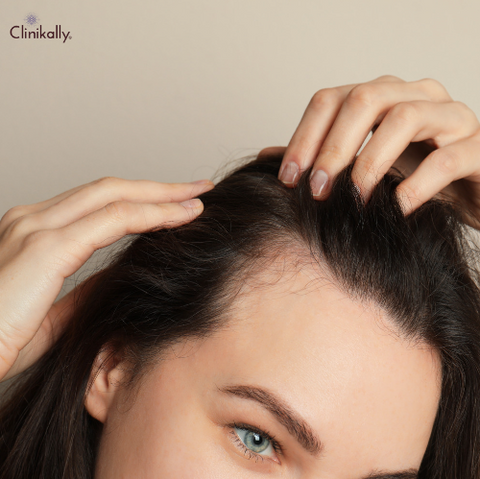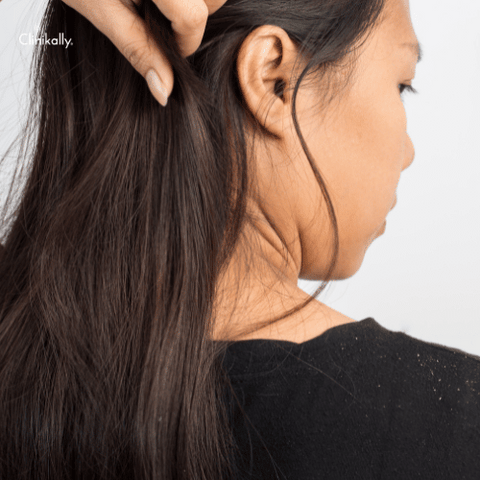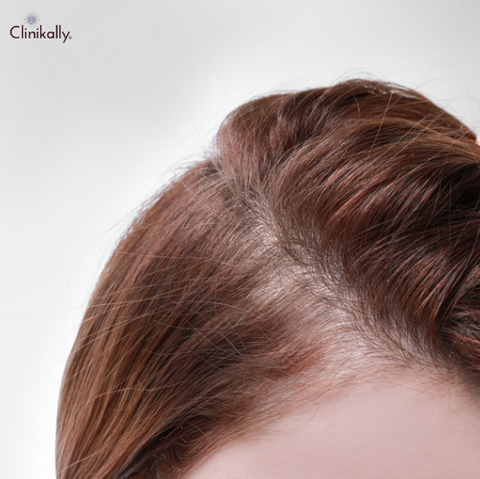Geraniol is a natural component that has gained popularity in the hair care industry due to its potential benefits for hair health. It has been shown to have antibacterial and anti-inflammatory properties. It is a fragrant component of several essential oils, including rose oil, citronella oil, and geranium oil. When used in hair care products, geraniol may help to improve scalp health, encourage hair growth, and give hair shine. Some of the potential benefits of using geraniol for hair care include improved scalp health, hair growth, gloss, and natural odour. It's crucial to employ geraniol in safe and effective amounts because it's a promising natural element for hair care products. Always read the label and test any new hair care products on a small area of the skin first to prevent allergic reactions.
What is Geraniol and How Does it Benefit Hair?

Essential oils like rose, citronella, and geranium frequently include the natural substance geraniol. It is frequently used in fragrances, cosmetics, and hair care products due to its pleasant floral scent. Geraniol, a component of hair care products, might help the health of hair in a number of ways:
-
Geraniol has been shown to have antimicrobial properties, which means it can aid in the fight against harmful microorganisms that can cause scalp irritation and dandruff.
-
Geraniol has anti-inflammatory properties, which can help soothe and calm an inflamed scalp.
-
Geraniol has been shown in studies to help stimulate hair growth by increasing blood circulation to the scalp and promoting hair cell proliferation.
-
Geraniol's natural conditioning properties can help improve the texture and appearance of hair, leaving it soft, smooth, and shiny.
A promising natural component for hair care products is geraniol. However, it's crucial to use it in safe amounts and to always adhere to product guidelines. Before using any new hair care product, it is advised to conduct a patch test to rule out any possible allergic reactions.
Geraniol as a Natural Hair Nourishing and Growth-Promoting Ingredient
Geraniol, a natural component, has been shown to have properties that nourish and promote hair growth. It has been long utilised for its therapeutic benefits and is a fragrant component of many essential oils, including rose oil, citronella oil, and geranium oil. The following are some potential advantages of geraniol for nourishing hair and accelerating hair growth:
-
Increased blood circulation: Geraniol has been demonstrated to improve blood flow to the scalp, which may aid in promoting the growth of hair follicles and stimulating hair growth.
-
Moisturising properties: Geraniol has natural moisturising properties that can help make hair look and feel better by leaving it moisturised, soft, and smooth.
-
Antioxidant properties: Geraniol has antioxidant properties that can help shield hair from environmental stressors like pollution and UV rays.
-
Anti-inflammatory properties: Geraniol has been demonstrated to possess anti-inflammatory properties, which can aid in calming and soothing an inflamed scalp.
Always read the product label and perform a patch test on any new hair care products before using them to prevent allergic reactions.
Geraniol and Its Effects on Hair Health and Repair
It has been demonstrated that the natural component geraniol has positive effects on the health and restoration of hair. It has been long utilised for its therapeutic benefits and is a fragrant component of many essential oils, including rose oil, citronella oil, and geranium oil. The following are some potential advantages of geraniol for the maintenance and restoration of hair:
-
Geraniol has been shown to possess strengthening qualities, which can aid in reducing hair breakage and damage.
-
Geraniol has antimicrobial properties that can help fight against harmful microorganisms that can cause dandruff and irritation of the scalp.
-
Geraniol has been proven to have anti-inflammatory properties, which can help calm and soothe an inflamed scalp.
-
The natural moisturising properties of geraniol can help improve the texture and appearance of hair, leaving it soft, smooth, and hydrated.
-
Geraniol's repairing properties have been demonstrated to help in the recovery of damaged hair follicles by promoting the production of collagen and elastin, two substances required for the growth of healthy hair.
The Potential Benefits of Geraniol for Hair Strengthening and Texture Improvement

A natural substance called geraniol may strengthen hair and enhance its texture. Here are a few ways that geraniol may help hair:
-
Strengthening properties: Geraniol has been shown to have strengthening properties, which can help prevent hair breakage and damage. This can result in thicker, stronger hair over time.
-
Smoothing properties: Geraniol has natural smoothing properties that can help improve the texture of hair, leaving it soft, smooth, and easy to manage.
-
Moisturising properties: Geraniol has natural moisturising properties that can help improve the overall health and appearance of hair. This can lessen the dryness and brittleness that can cause breakage in the hair.
-
Anti-inflammatory properties: Geraniol has been shown to have anti-inflammatory properties, which can help soothe and calm an inflamed scalp. This can promote healthy hair growth and improve the overall health of the hair and scalp.
-
Antioxidant properties: Geraniol has antioxidant properties that can help shield hair from environmental stressors like pollution and UV rays. This can help prevent damage to the hair and scalp and promote the growth of strong, healthy hair.
To strengthen hair and enhance texture, geraniol is a promising natural component, but it must be used in safe and effective doses. Always read the product instructions and patch-test any new hair care products before using them to avoid allergic reactions.
Geraniol and Its Role in Strengthening Hair from Root to Tip
Geraniol has several properties that make it beneficial for strengthening hair from the roots to the tips. Here are some of the ways geraniol can help improve hair strength:
-
Geraniol is a natural ingredient with nourishing properties that can help improve the health of your hair. The likelihood of hair becoming brittle or breaking easily is lower when it is healthy and well-nourished.
-
Geraniol has natural moisturizing qualities that can aid in hydrating hair all the way from the roots to the tips. Hair that is well-hydrated is less likely to become dry and brittle, resulting in breakage.
-
Geraniol has been shown to have anti-inflammatory properties, which can aid in the relief of an inflamed scalp. This can aid in the promotion of healthy hair growth and the prevention of hair damage.
-
Antioxidant properties of geraniol can aid in protecting hair from damage brought on by environmental stressors like pollution and UV rays. This can help prevent hair and scalp damage and promote healthy hair growth.
-
Geraniol has been shown to have strengthening properties, which can help prevent hair breakage and damage. This can lead to thicker, stronger hair over time.
Geraniol and Its Impact on Hair Texture and Moisture
A naturally occurring substance called geraniol is present in many plants, including geraniums, lemongrass, and roses. Due to its appealing perfume and probable health advantages, it is frequently used in the fragrance and cosmetic sectors. Geraniol's direct effects on hair structure and moisture have received little attention from researchers, however, some studies point to a potential benefit for hair health. In one study, participants with damaged hair experienced an improvement in texture, lustre, and compatibility after using a hair conditioner containing geraniol and other natural substances. Additionally, the study found that the treated hair had better moisture retention and less breakage. The effects of a shampoo containing geraniol on hair growth and thickness were the subject of another study that was published in the International Journal of Trichology. The shampoo enhanced hair growth and thickness in people with thinning hair, according to the data.
It is important to keep in mind that these studies have a narrow focus and might not accurately capture how geraniol affects different hair types or people in general. In addition, geraniol sensitivity can cause skin rashes or allergic responses in some users of goods containing this ingredient.
Understanding the Safety and Efficacy of Geraniol in Hair Care Products

Geraniol is a naturally occurring substance that may be found in a variety of plants. Because of its pleasant aroma and potential health advantages, it is frequently used in hair care products. But it's crucial to comprehend the efficacy and safety of geraniol in these products. Regulatory organisations like the European Food Safety Authority (EFSA) and the US Food and Drug Administration (FDA) have assessed the safety of geraniol. Geraniol is generally recognized as safe (GRAS) when used in food and cosmetic products at concentrations below the advised limits, according to these organisations.
According to efficacy, certain research indicates that geraniol may benefit the health of hair. As was previously said, a study indicated that participants with damaged hair had an improvement in texture, lustre, and compatibility after using a hair conditioner containing geraniol and other natural substances. The results of a different study, which was also published in the International Journal of Trichology, showed that participants with thinning hair had an improvement in hair growth and thickness when using a shampoo containing geraniol. It is important to keep in mind that these studies have a narrow focus and might not accurately capture how geraniol affects different hair types or people in general. In addition, geraniol sensitivity can cause skin rashes or allergic responses in some users of goods containing this ingredient.
Research on Geraniol and Its Effects on Hair Health and Safety
A study that was published in the Journal of Cosmetic Science looked at how participants with damaged hair responded to the texture, gloss, combability, and breakage effects of a hair conditioner containing geraniol and other natural components. According to the study, the conditioner greatly enhanced the texture, lustre, and combinability of hair while lowering breakage. The study's findings suggest that geraniol and the conditioner's other organic components may help restore the health and beauty of hair that has been damaged. Another study examined the impact of a shampoo containing geraniol on hair development and thickness in people with thinning hair. It was published in the International Journal of Trichology. In comparison to a placebo, the shampoo greatly increased hair growth and thickness, according to the study. The researchers hypothesised that geraniol's capacity to boost blood flow to hair follicles and enhance the delivery of nutrients and oxygen to the hair may be the cause of its effects on encouraging hair development.
The potential health advantages of geraniol, including its anti-inflammatory, antioxidant, and antibacterial characteristics, were outlined in an article published in the Journal of Medicinal Food. Geraniol may be helpful in preventing or treating a number of ailments, including problems with the skin and hair, according to the review. Geraniol is generally recognized as safe (GRAS) when used in food and cosmetic products at concentrations that don't go above the advised limits, according to regulatory organisations like the European Food Safety Authority (EFSA) and the United States Food and Drug Administration (FDA). The use of products containing geraniol, however, may cause skin rashes or allergic reactions in certain people who are sensitive to the substance. Before using any new geraniol-containing hair care product, a patch test is advised. If any negative responses happen, use should be stopped.
The Importance of Ingredient Safety and Product Formulation in Hair Care
Ingredient safety and product composition are critical in hair care. The chemicals and substances in hair care products are extremely sensitive to the scalp and hair, and using incorrect formulas or dangerous ingredients can result in a variety of issues such as dryness, irritation, hair loss, and damage. Hair care products should contain ingredients that are safe for the scalp and hair. Regulatory bodies such as the European Union's Scientific Committee on Consumer Safety (SCCS) and the United States Food and Drug Administration (FDA) evaluate the safety of ingredients in hair care products. These organisations examine the available scientific data to determine the safety of components used in hair care products and to set standards for their use in cosmetics.
Additionally, it's critical that components in hair care solutions are blended properly to provide the intended effects while minimising risk. For instance, substances that effectively hydrate hair without weighing it down or making it greasy should be used in hair care products that are intended to moisturise hair. Similarly, substances used in products meant to create volume or control frizz should do so without endangering the hair or irritating the skin. Hair care product producers should carry out thorough testing and quality control measures to guarantee the safety and effectiveness of their products. This entails screening the finished products and ingredients for irritants, allergens, and contaminants. Additionally, it's important for hair care products to have accurate and clear labelling that includes information on the ingredients and recommended usage.
Incorporating Geraniol into Your Hair Care Routine

There are a few things to keep in mind if you want to use geraniol in your hair care regimen. Start by looking for hair care items that include geraniol in their ingredient list. Shampoos, conditioners, and hair oils made of natural and organic ingredients frequently contain geraniol. Examine the product label carefully to ensure that geraniol is listed as an ingredient and that the product is made up of other safe and effective ingredients.
Consider your hair type and any particular hair concerns you may have. For example, if you have dry or damaged hair, you might want to try a hair conditioner containing geraniol and other moisturising ingredients to help restore hydration and improve hair texture. If you are concerned about hair thinning or loss, geraniol shampoo may help to promote hair growth and thickness. When using geraniol-containing hair care products, it is critical to follow the manufacturer's instructions and use the product as directed. Before using the product for the first time, perform a patch test to check for any adverse reactions or sensitivity. If you experience any irritation or discomfort, stop using the product and consult a healthcare professional.
Keep in mind that, while geraniol may have some positive effects on hair health, it does not guarantee that it will solve all hair-related problems. Other factors such as nutrition, lifestyle, and heredity can all have an impact on the health of your hair. As a result, maintaining a healthy hair care regimen that includes a balanced diet, consistent exercise, and appropriate hair care techniques is critical.
The Best Ways to Use Geraniol for Nourished, Healthy, and Beautiful Hair
When used correctly, geraniol can be a beneficial ingredient for nourishing, strengthening, and beautifying hair. Here are some of the best geraniol uses for healthy, beautiful hair:
-
Use a shampoo with geraniol: Geraniol-containing shampoos can help promote hair growth and thickness, improve blood circulation to the scalp, and nourish and strengthen hair follicles. Massage the shampoo into your scalp and hair, then thoroughly rinse.
-
Apply a conditioner containing geraniol: Geraniol-containing conditioners can help to moisturise and nourish the hair, making it softer, smoother, and easier to manage. Start at the ends of your hair and work your way up, avoiding the scalp. Leave it on for a few minutes before thoroughly rinsing.
-
Apply a geraniol-containing hair oil: Geraniol-containing hair oils can help to strengthen the hair shaft, protect against environmental damage, and add shine and moisture to the hair. Apply a few drops of hair oil to your palms and work through your hair, concentrating on the ends.
-
Use a geraniol-containing hair mask: Geraniol-containing hair masks can help to deeply nourish and strengthen the hair, repair damage, and promote healthy hair growth. Apply the mask to clean, damp hair and leave it on for the recommended time before thoroughly rinsing.
-
Consider taking a supplement: Geraniol supplements are available in some health food stores and online. They may promote overall hair health by providing essential nutrients and antioxidants that nourish the hair from within.
It's vital to keep in mind that, even though geraniol may have some positive effects on hair health, it's still crucial to follow a healthy overall hair care regimen that includes frequent washing and conditioning, a balanced diet, and appropriate hair care techniques.
Common Hair Care Products that Contain Geraniol and Alternatives to Consider
Geraniol is an ingredient in a variety of hair care products, including shampoos, conditioners, hair oils, and hair masks. However, due to worries about sensitivity or allergies, some people might choose to stay away from goods that contain geraniol. Here are a few popular hair care items with geraniol as well as some suitable substitutes to take into account:
-
Shampoos: Geraniol is found in many natural and organic shampoos. If you want to avoid geraniol, look for shampoos with natural ingredients like tea tree oil, peppermint oil, or chamomile extract.
-
Conditioners: Natural and organic conditioners frequently contain geraniol. If you want to stay away from geraniol, look for conditioners with natural substitutes like aloe vera, shea butter, or coconut oil.
-
Hair oils: Hair oils meant to hydrate and safeguard hair frequently contain geraniol. If you want to stay away from geraniol, look for hair oils with natural substitutes like rosehip oil, jojoba oil, or argan oil.
-
Hair masks: Many natural and organic hair masks contain the ingredient geraniol. If you want to stay away from geraniol, look for hair masks with natural substitutes like honey, avocado, or banana.
-
Styling products: Geraniol is often used in styling products such as hair sprays and gels. Look for styling products that contain natural alternatives to geraniol, such as beeswax, vegetable glycerin, or lavender oil.
A patch test should always be done before using a new product if you have any concerns about sensitivity or allergies to geraniol or any other ingredient used in hair care, and you should always consult a healthcare professional if you experience any negative side effects.
Final Thoughts: The Power of Geraniol for Achieving Your Best Hair Yet

Geraniol is a natural substance that has many benefits for growing healthy, gorgeous hair. While its anti-inflammatory and antifungal effects can aid to calm and preserve the scalp, its antioxidant characteristics can help to protect hair from damage. Geraniol is a beneficial element to seek in hair care products because it can also enhance hair texture, hydration, and growth. Geraniol is usually considered safe to use, however, it is necessary to be aware of any possible allergies or sensitivities. Stop using immediately and seek medical advice if you have any negative effects. Incorporating geraniol into your hair care routine can be a great way to nourish and strengthen your hair from the inside out. Consider trying some of the products or methods mentioned in this article and see how geraniol can help you achieve your best hair yet.
































